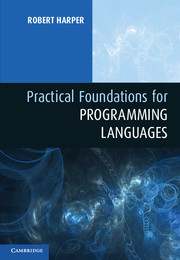Book contents
- Frontmatter
- Contents
- Preface
- Part I Judgments and Rules
- Part II Statics and Dynamics
- Part III Function Types
- Part IV Finite Data Types
- Part V Infinite Data Types
- Part VI Dynamic Types
- Part VII Variable Types
- Part VIII Subtyping
- Part IX Classes and Methods
- Part X Exceptions and Continuations
- Part XI Types and Propositions
- Part XII Symbols
- Part XIII State
- Part XIV Laziness
- Part XV Parallelism
- Part XVI Concurrency
- Part XVII Modularity
- Part XVIII Equational Reasoning
- 47 Equational Reasoning for T
- 48 Equational Reasoning for PCF
- 49 Parametricity
- 50 Process Equivalence
- Part XIX Appendix
- Bibliography
- Index
50 - Process Equivalence
from Part XVIII - Equational Reasoning
Published online by Cambridge University Press: 05 February 2013
- Frontmatter
- Contents
- Preface
- Part I Judgments and Rules
- Part II Statics and Dynamics
- Part III Function Types
- Part IV Finite Data Types
- Part V Infinite Data Types
- Part VI Dynamic Types
- Part VII Variable Types
- Part VIII Subtyping
- Part IX Classes and Methods
- Part X Exceptions and Continuations
- Part XI Types and Propositions
- Part XII Symbols
- Part XIII State
- Part XIV Laziness
- Part XV Parallelism
- Part XVI Concurrency
- Part XVII Modularity
- Part XVIII Equational Reasoning
- 47 Equational Reasoning for T
- 48 Equational Reasoning for PCF
- 49 Parametricity
- 50 Process Equivalence
- Part XIX Appendix
- Bibliography
- Index
Summary
As the name implies, a process is an ongoing computation that may interact with other processes by sending and receiving messages. From this point of view a concurrent computation has no definite “final outcome” but rather affords an opportunity for interaction that may well continue indefinitely. The notion of equivalence of processes must therefore be based on their potential for interaction, rather than on the “answer” that they may compute. Let P and Q be such that ⊢σP proc and ⊢σQ proc. We say that P and Q are equivalent, written as P ≈σQ, iff there is a bisimulation R such that P RσQ. A family of relations R = {Rσ}σ is a bisimulation iff whenever P may evolve to P′ taking the action α, then Q may also evolve to some process Q′ taking the same action such that P′ RσQ′, and, conversely, if Q may evolve to Q′ taking action α, then P may evolve to P′ taking the same action, and P′ RσQ′. This captures the idea that the two processes afford the same opportunities for interaction in that they each simulate each other's behavior with respect to their ability to interact with their environment.
Process Calculus
We consider a process calculus that consolidates the main ideas explored in Chapters 41 and 42. We assume as given an ambient language of expressions that includes the type clsfd of classified values (see Chapter 34).
- Type
- Chapter
- Information
- Practical Foundations for Programming Languages , pp. 446 - 452Publisher: Cambridge University PressPrint publication year: 2012

